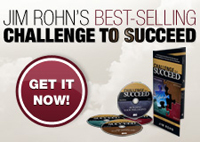Just joining us? Be sure to read Installment #1 and #2

Here
is a simple (but don’t let the simplicity fool you!) but PROFOUND plan
to immediately multiply your productive output many times over your
current rate.
I’m not talking about activity (more work, more time). I said
productivity (results, money, accomplishment, goal attainment)… all the
while, living much more stress free and carefree existence (more time
for family, fun and hobbies!).
Let me outline a
5-point Superachiever Productivity Plan for you… this is what I do.
No. 1—Plan tomorrow today. Jim Rohn taught me,
“Don’t start your day until it is finished on paper.” And the best time
to do this is the day before.
This is an important and many times not so easy-to-keep discipline.
The last thing I do before I shut down for the day, by routine, is to
review and complete the plan for the following day.
The entire process takes less than 10 minutes. What you don’t want to
do is wake up and then figure out what you should be doing—it’s way too
late by then. Chances are the rest of the world will have decided what
it wants you to do and it will control your day, instead of you. You
will be reacting instead of creating.
Let me take you through that simple planning process, since the key to brilliant execution is always brilliant planning.
That takes us to…
No. 2—Review, or establish if you don’t already have, your
BIG 3.
These are your top three goals for the year. Not 100 goals, or 10
goals; it’s critical you to focus them down to just your BIG 3—your top
and most important goals. The kind of goals that if you only
accomplished those three you would undoubtedly have your best year ever.
This review and focus process is important to calibrate and align point number three…
No. 3—Identifying your
3 MVPs—your
three Most Valuable Priorities: those few activities that are worth five
to ten times the value of all the rest of the tasks.
“If you have more than three strategic priorities, you don’t have any.” —Jim Collins
No. 4—Now that you have your 3 MVPs, take your calendar for tomorrow and
chunk.
This is where you block out chunks of time on your calendar to
specifically work your 3 MVPs. What doesn’t get scheduled doesn’t get
done.
Additional Tip: During these important time chunks,
clear the potential distractions. Put yourself in a “cone of silence.”
Turn off your phones, your email, your Facebook, Twitter or anything
else that can reach you. Also shut your door; you don’t need to have an
open-door policy all the time. There is a time for intensely focused,
undisturbed productive work.
I put a sign on my door that says when I will be available next. This
way if someone comes looking for me, I am not just simply unavailable;
it is clear when I will be available next. No problem. If you find
keeping the distractions away from you difficult then maybe do what I do
often—go somewhere where you can’t be found and is away from your
typical addictive distraction traps. I will go to a library, to a
colleague’s unused conference room or even in my car parked at the beach
or in a park. I am AMAZED at how much creative work I get done when I
separate from my normal environment, which is full of distraction
devices and temptations.
Now that you have your BIG 3 goals reviewed, your 3 MVPs aligned to
them and your time chunks allocating to executing on those MVPs, we can
now discuss what to do tomorrow.
No. 5—The very first thing you should do when you
enter the office—don’t check email, don’t sort your mail, don’t review
the morning news—is lick your chops and
Eat That Frog
(the title of a Brian Tracy book). Take the nastiest but most important
priority of the day, and eat it first. Spend 90 minutes in your cone of
silence doing nothing but executing, with complete and uninterrupted
focus, on your most important priority… for 90 minutes straight. No
more, no less.
If you do this, you will get more done. More important, you’ll get
more done of what is IMPORTANT than most people will get done in two or
three days of constantly interrupted and distracted 12-hour days in the
office.
 Exclusive Audio!
Exclusive Audio!
Hear an audio explanation of my 5-Point Productivity Plan:
Click here to listen
Superachiever 5-Point Productivity Plan Cheat Sheet:
1) Plan your day the night before
2) Review your BIG 3
3) Decide your 3 MVPs
4) Chunk out times on your calendar for your 3 MVPs
5) Eat That Frog—your No. 1 MVP first thing in the morning for 90 minutes.
Download free PDF Worksheet here: Superachiever Daily Productivity Planning
What do you do to plan and prepare for a high-performance day? Share your ideas with the community in the comments below.












